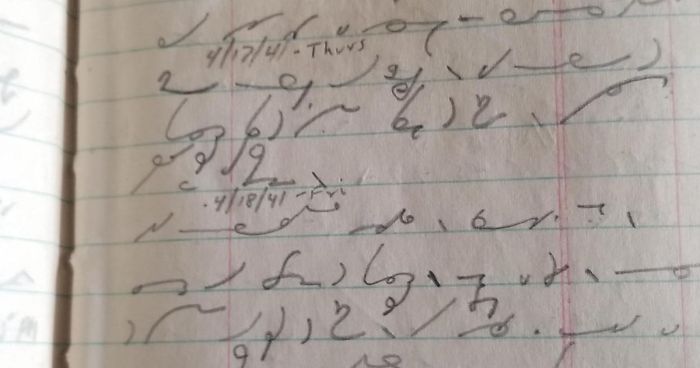
Man Finds His Grandpa’s WWII Diary But Can’t Read What’s Written Inside, The Internet Helps To Translate It
We know that we’re not supposed to read someone else’s diary, but sometimes it’s simply too hard to resist. Especially when it’s a diary from WWII era! One Imgur user named mynameisbetterthanyours420x69 found their grandpa’s diary from his time in the war and decided to take a look. Too bad for them, the entire diary was written in shorthand, that, unfortunately, the grandchild wasn’t equipped enough to decode.
Well, it wouldn’t be the internet if someone’s request for help wouldn’t be answered almost immediately. After sharing the snaps of the diary on subreddit r/shorthand, the grandkid quickly received help from a kind stranger who took time out of their day to decode the pages. “I don’t seek out this sort of translation work, but I do read a bit of shorthand at home,” uwula told Bored Panda. “You can find whole novels, religious texts, and so on, transcribed into various systems of shorthand, […] naturally the shorthand in these books is easier to read than someone’s diary, just as handwriting examples from textbooks are easier to read than everyday scrawl,” they explained.
Here’s the translation of the diary by Reddit user uwula:
One person posted their grandpa’s diary from the WWII era, seeking people who know shorthand
“1
4/9/41 – Wed
Left […] 5:30 AM rode […] street car to armory. Arrived 8:00. Stripped all clothing except shoes and coat. Walked through at least 20 rooms for various examinations. Completed examinations at about 10:00 AM. […] to walk to an eye, ear, nose and throat doctor. [He had to … papers and most … in alcohol and … in cotton]. Some should have been rejected for various ailments but the doctor asked them if they wanted to go in the army. If they said yes he would pass them. Some would be passed for poor sight as long as they could read with their own glasses. One fellow I know was passed [who] was 38 pounds overweight. Walked from 10 to 4 with [… our lunch]. [I had] my choice for [dinner …] others only had pork chops. Ate by myself I had supper [ate the bunch]. Out of 620 men about 10 of us […] because we passed”
“our examinations first. My number was 27. Left for Camp Grant at 8:30 on IC. We had the whole train to ourselves with a lot of room left over. 13 hours standing, […ing] and walking really tired me out. [V-u-k-s-e-n-e-k] is with our [bunch] and he had his picture in the […] paper.
4/10/41 – Thurs”
“Arrived Camp Grant about 11:00 PM. Had […] lunch of beef stew and and our plates were filled to the brim. Assigned to barracks B-204 cot 22. Very comfortable. Could not sleep till 2:00 AM. Awake at 6:00 AM. [Received company … … future]. Rated class #2 on […] test 119 right out of 150. Took typing test for [rating] in army. Passed by score of 45. Received shot for [typhoid … always] vaccinated. Had turkey”
“for dinner with all trimming. Was allowed leave until 11:00 PM but stayed in to write letters. Arm is getting a little sore from the shot. Most of the gang went to town to celebrate but they had to wait for bus or walk.
4/11/41 – Fri
Went to church today and stood [… over …]. Worked all day long washing, sweeping, and scrubbing. Most of the fellows have been [transferred] to different barracks. There are only 5 of us left out of 24. They went to another barracks for medical corps. Had eggs and toast for breakfast. Didn’t eat any dinner because my bowels were not working right. Took a laxative.”
“4/12/41 – Sat
New men came into our barracks from Detroit. Cleaned up barracks. Did a little marching. In the afternoon we went to Rockford and had a few beers went to show and ate supper. Saw Gypsy Rose Lee do her strip act. […] in town then […]. Came in at”
“10:00 PM
4/13/41 – Sun
Easter Sunday. Rained all day. Stayed in the barracks. Played cards and won $4. Mailed 10 postal cards and one letter.
4/14/41 – Mon
Left Camp Grant for Camp Shelby 10:10. Arrived […] 5:00 PM due to taking on freight […]. Came in to St. Louis at 8:00 PM. Slept in upper bunk. Passed through Kentucky and [Missouri] during the night. Awoke while in Tennessee. Very hilly. Mississippi very wooded many lumber mills. Many [checks] along rail road. Arrived Camp Shelby 3:15 PM.”
“4/15/51 – Tues
Took total 29 hours. Food on train very bad due to some mistake. Canned corn, beef, jam, beers and [coffee]. All we did there on (the) train was watch scenery. Real inspection at Camp Shelby. Band played and trucks took us to our company. Put in Company I a clearing company.”
“Our company composed mostly of Wisconsin and Michigan men. Very few from Illinois. Had supper of beef stew. [Moved] into tents. 16′ square 5 beds
4/16/41 – Wed
Pancakes for breakfast beef for dinner ham bone for supper. Shown marching tactics and took a short walk. Dug sod in the afternoon. Was good little exercise. Rode from one end to the other of camp in army truck.
4/17/41 – Thurs
Usual march and exercise. Oatmeal for breakfast beef for dinner [beers] for supper. Dig dirt all afternoon.”
“4/18/41 – Fri
Taught military courtesy. Saluting [instruction]. Eggs and bacon for breakfast. Inspection of feet. […] for dinner and fish for supper. Did quite a lot of shoveling in the afternoon. Drank 3 cans of beer. […]
4/19/41 – Sat
[…] in the morning. Inspection by Major in the […]. Did very little work in the afternoon. All our clothing displayed for inspection. Scrambled eggs breakfast. Ham for dinner and ate raw celery for first time. Ham bone for supper. Drank 2 cans beer. [… and paper].”
Shorthand is a type of abbreviated writing method as opposed to the usual writing we’re all familiar with, longhand. The shorthand system provides symbols for words and common phrases and was usually used to write down things as quick as people speak. It was used more widely in the past, especially in journalism and police work. It was also used to conserve writing space.
“One or two entries were difficult to work out, only because shorthand forms are very fragile,” uwula told of their experience translating the diary. “Imperfections which in longhand would render one letter ugly, in shorthand will alter the meaning of an entire word or phrase,” they concluded.
Before the translation was posted online, however, some internet users shared ‘translations’ of their own:
123Kviews
Share on FacebookExcept for the abbreviations for the days of the week, plus numbers.
Load More Replies...What a great find! I'm not WWII old but I did take shorthand in high school in the late 80's. It's slowly coming back to me. Definitely a use it or lose it language!
We used to learn it in late 1990s too, at elementary school. Mine still looks childish. ♥
Load More Replies...Except for the abbreviations for the days of the week, plus numbers.
Load More Replies...What a great find! I'm not WWII old but I did take shorthand in high school in the late 80's. It's slowly coming back to me. Definitely a use it or lose it language!
We used to learn it in late 1990s too, at elementary school. Mine still looks childish. ♥
Load More Replies...
 Dark Mode
Dark Mode 

 No fees, cancel anytime
No fees, cancel anytime 






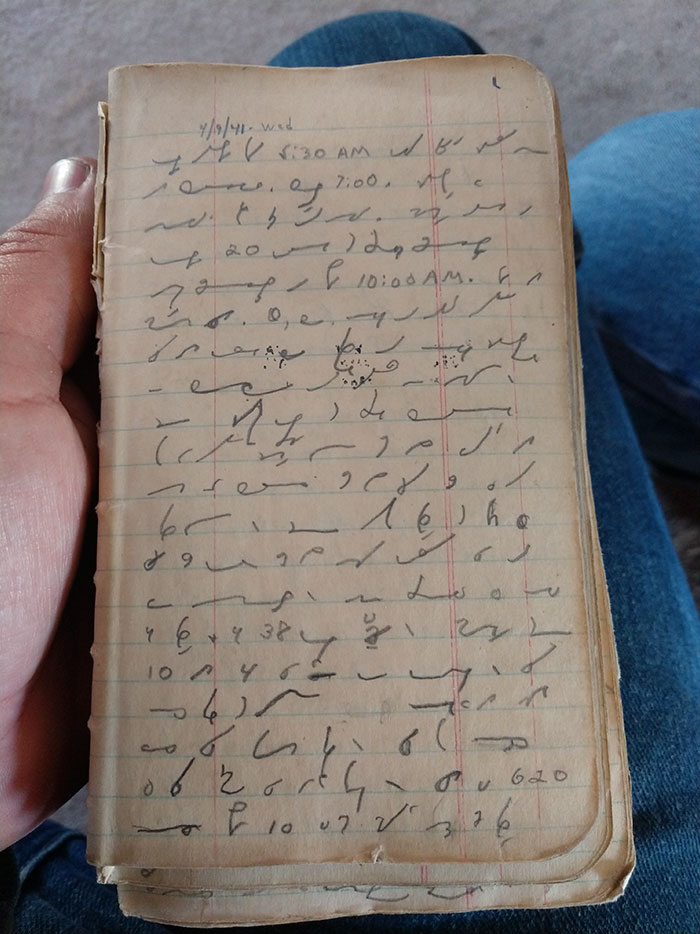
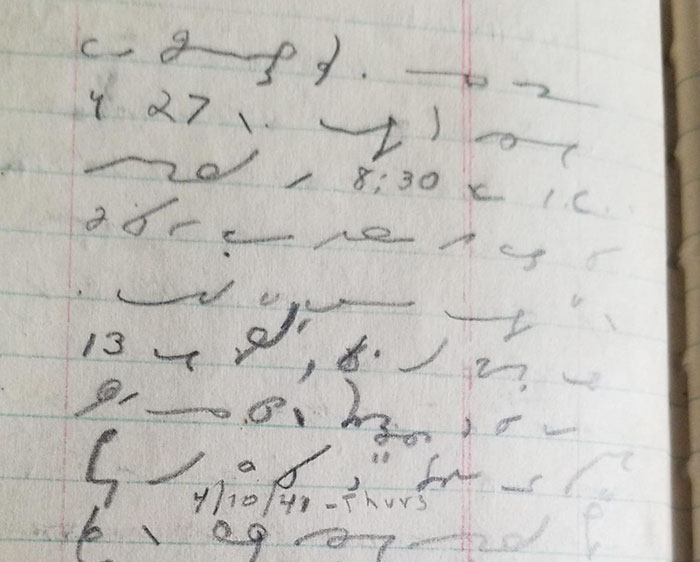
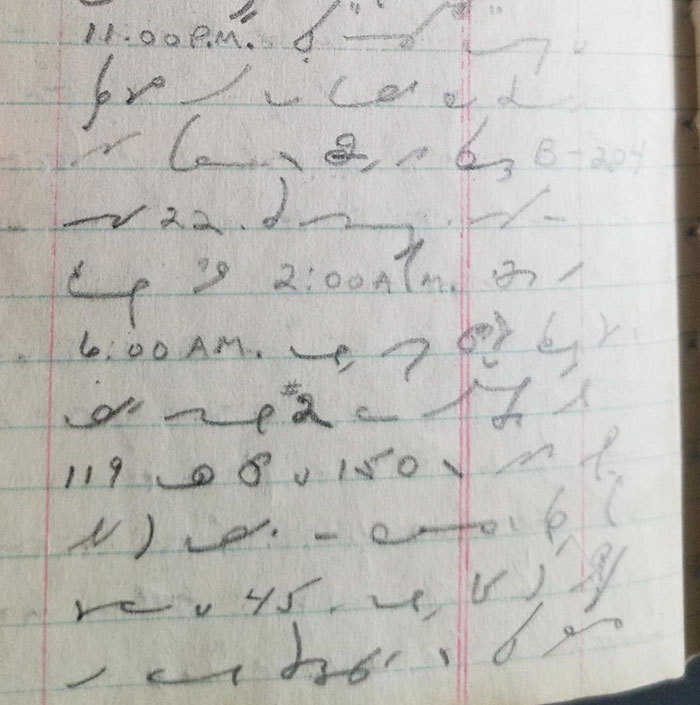
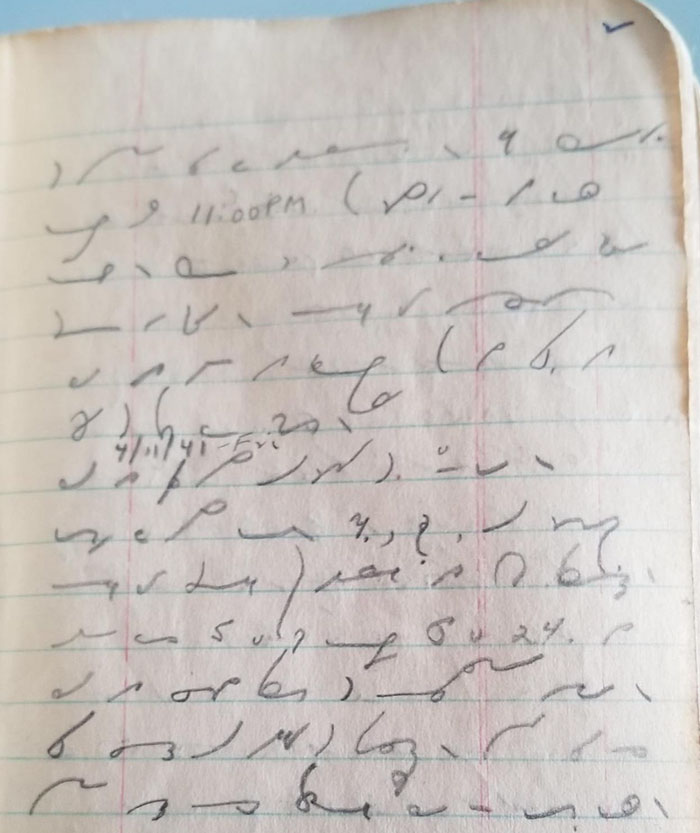
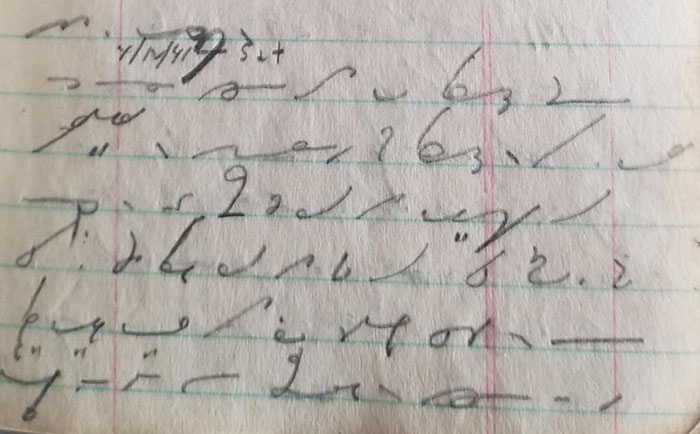
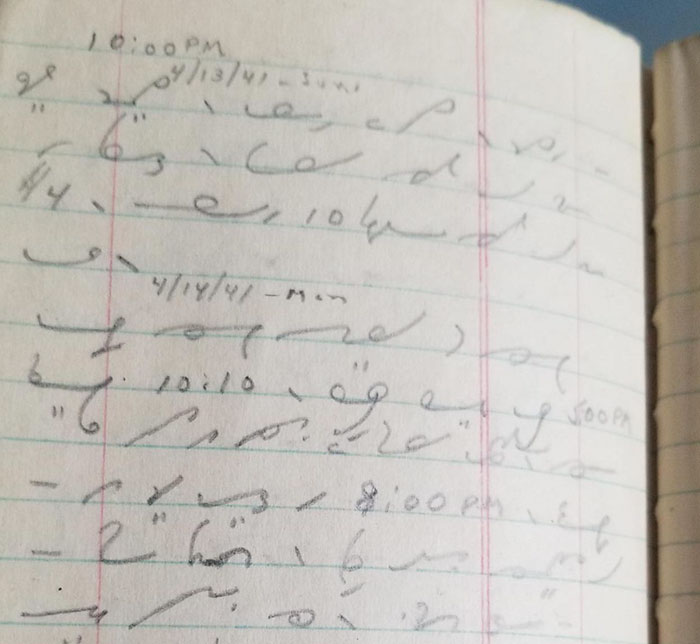
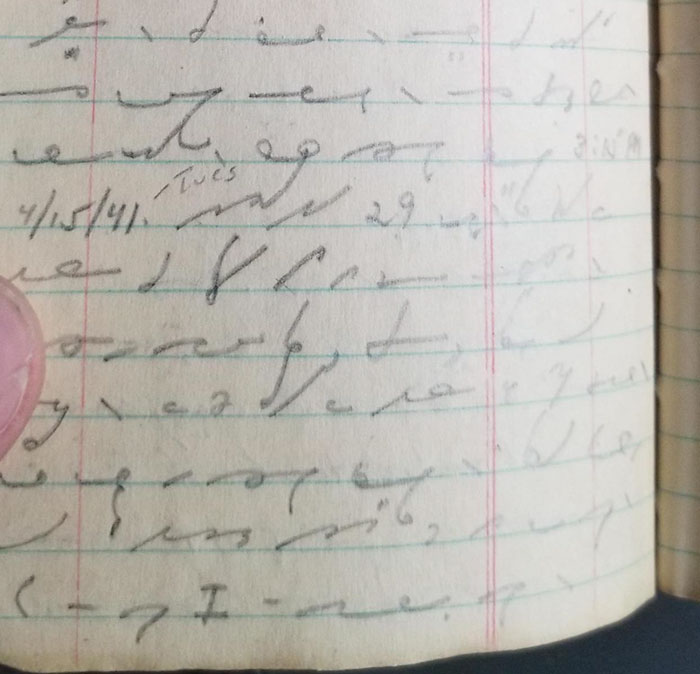
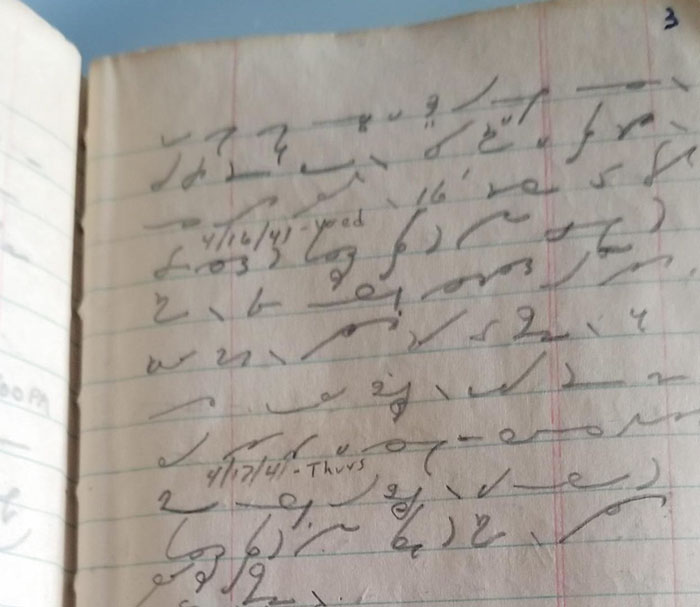
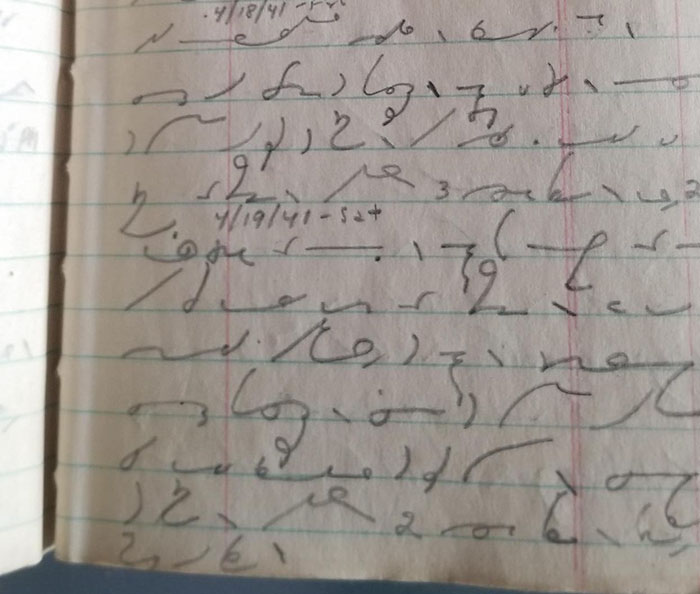

















































251
47